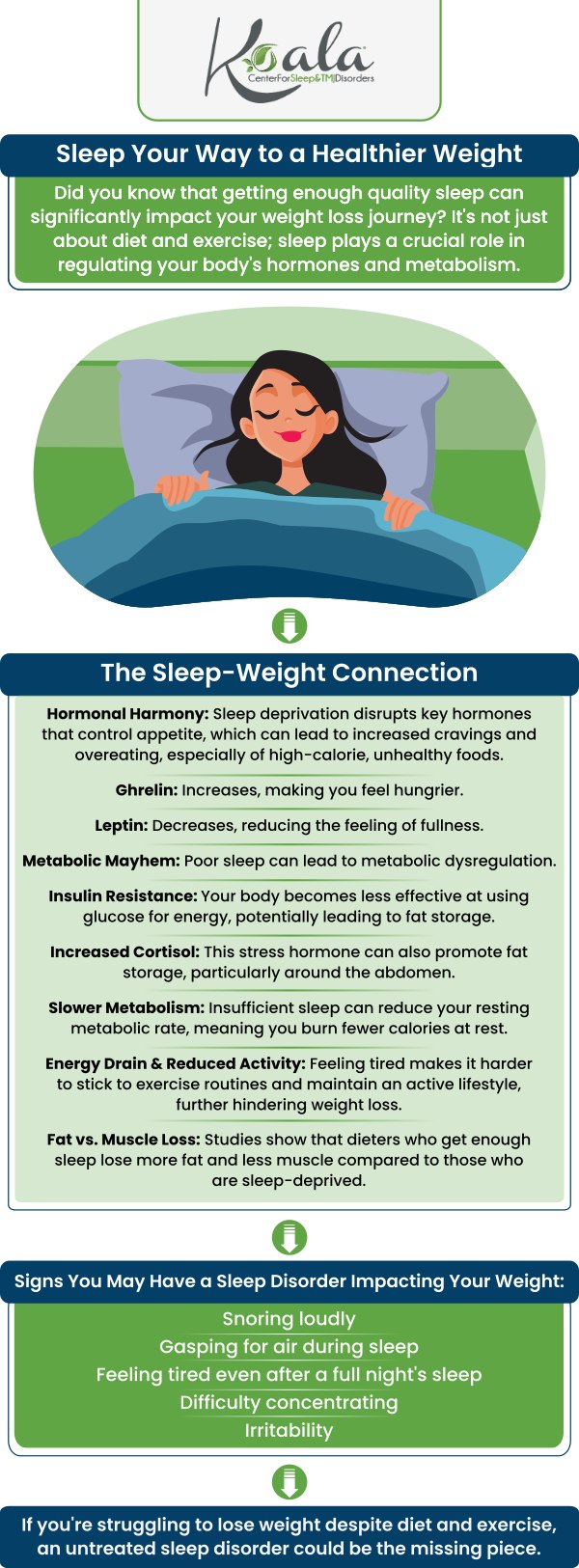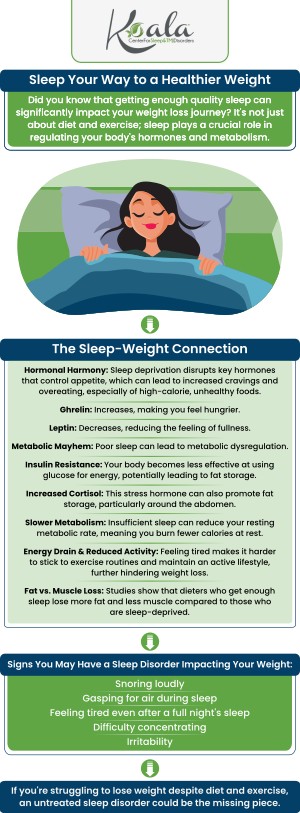How Does Sleeping Well Help You Lose Weight?
If you are on your weight loss journey, you need to fix your sleep cycle. A good sleep routine and a healthy lifestyle will give you much better results. Come to the Koala® Center For Sleep & TMJ Disorders and talk to our professionals. For more information, contact us or book an appointment online. We have convenient locations across the U.S. in Bloomington IL, Peoria/Dunlap IL, El Paso TX, and Wausau WI.




Table of Contents:
How does sleeping well help you lose weight?
How does sleep affect weight loss?
How many hours should I sleep to lose weight?
Does sleeping increase metabolism?
Struggling with Weight? Get Help from the Sleep Specialists at Koala® Center For Sleep & TMJ Disorders
Sleeping well is good for your health and can help you lose weight. Insufficient sleep has been repeatedly linked to weight gain and a higher body mass index (BMI). Various studies have confirmed that there is a significantly elevated risk of obesity associated with short sleep, which is defined as less than 7 hours each night.
Furthermore, getting enough sleep regulates your appetite. Individuals who are consistently sleep-deprived report increased appetite and subsequently have a higher caloric intake. This is because the extra time spent awake increases opportunities for late-night snacking on junk food. Sleep deprivation causes people to consume an average of 385 extra calories per day. In addition to appetite regulation, getting enough sleep has a positive effect on the function of your metabolism and immune system.
The bottom line is that getting the right amount of sleep is extremely important to your wellness. Failing to do so can have far-reaching consequences for both your mental and physical health. If you struggle to lose weight despite consistent efforts, it’s essential to consider how your sleep quality affects your health.
If you aren’t sleeping enough, it can hurt your general wellness and your weight. Sleep is incredibly crucial to various body systems, including the endocrine system, the immune system, and metabolic processes.
One of the key ways that insufficient sleep leads to weight gain is by triggering a spike in cortisol. Cortisol is a stress hormone that tells your body to conserve energy, meaning your body hangs on to fat. In addition, four days of sleep deprivation significantly affects the body’s ability to process insulin. This is detrimental to weight management efforts, as insulin is crucial for converting starches and sugars into energy.
When you are on a weight loss journey, getting enough sleep should be your top priority if you want to see lasting outcomes. Being sleep-deprived impacts your ability to make healthy food choices and get enough exercise. By sleeping enough, you can feel alert and full of energy, as well as achieve your weight loss goals.
To lose weight, it’s essential to lead a healthy lifestyle. Among various habits such as nutritious eating, hydration, and regular exercise, getting enough sleep is incredibly important when you are on a weight loss journey.
You should aim for 7 to 9 hours of sleep each night for optimal health and wellness. Getting enough hours boosts your immunity, improves mood regulation, increases focus and concentration, and supports your weight management efforts by shedding unwanted pounds. If you struggle to get enough sleep consistently, it’s advised to schedule a visit with a sleep health expert. They can help you find the root issue preventing you from getting sufficient rest and address it holistically.
Sleep does not increase metabolism as certain activities, such as physical exercise, do. Your metabolism slows down by around 15% while you are sleeping. Now, don’t let this slowdown cause alarm. It’s a natural and necessary part of the body’s rhythm. During the various stages of sleep, the body undergoes crucial processes such as tissue repair, hormone regulation, and memory consolidation.
The relationship between sleep and metabolism is intricate. Chronic sleep deprivation and irregular sleep patterns can disrupt the delicate balance of hormones that regulate appetite, leading to an increased likelihood of weight gain. Additionally, inadequate sleep has been associated with insulin resistance, which can lead to the development of type 2 diabetes.
Overall, sleep and metabolism are undeniably connected. The key takeaway is that getting enough sleep is paramount to taking care of your overall wellness and boosting your weight loss efforts. When you sleep enough, your risk of various illnesses is reduced, and your body has enough time to rest and recuperate. Call us today to schedule your consultation with our providers.
At Koala® Center For Sleep & TMJ Disorders, we understand that struggling with your weight can be a complex and frustrating journey. Our team of sleep specialists recognizes the powerful connection between a good night’s rest and a healthy metabolism. We know that conditions like sleep apnea can hinder weight loss efforts and even contribute to weight gain. By providing a proper diagnosis and an effective treatment plan, such as a custom oral appliance, we can help you get the restful, uninterrupted sleep your body needs to regulate hormones and support your weight loss goals. Let us help you unlock your body’s full potential for a healthier, more vibrant life. Call us today to schedule your consultation with our providers.

Additional Services You May Need
▸ KoalaKIDZzz®
▸ Sleep Apnea
▸ Snoring
▸ TMJ Disorder
▸ Fatigue
▸ Sleep Disorders
▸ Weight Loss
▸ CPAP Alternative
▸ Oral Appliances




